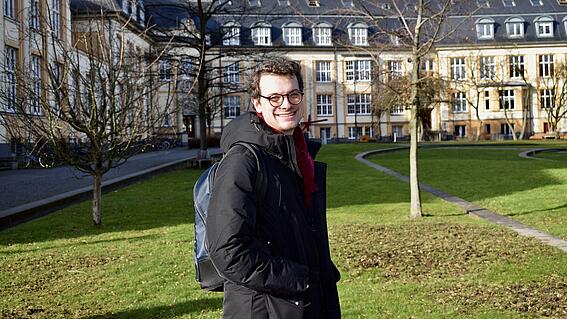WHAT IS THE MAJOR FOCUS OF YOUR RESEARCH IN FRANCE AND HERE?
My research focuses on performance of obligations and in particular alternative performance of obligations. I study legal remedies which are oriented towards a satisfaction in kind of the creditor, although they are not specific performance. This is true notably of monetary claims for the costs of a substitute transaction, but also of alternative performance in kind (such as acceptance in lieu of performance).
At Bucerius Law School, I focus on the German approach to this problem, notably by studying the power of substitution (Ersetzungsbefugnis) and self-help (Selbstvornahme). This comparative work will enhance my doctoral dissertation on French law and may contribute to the development of shared solutions.
WHAT MAKES YOUR AREA OF RESEARCH RELEVANT?
My research on performance of obligations is mostly relevant for the effectiveness of contract and torts law: I study legal remedies oriented towards the concrete satisfaction of the creditor’s interests.
It is also important because it allows for a better distinction between different legal remedies. For example, the term “damages” is often used to describe monetary claims to the necessary costs of performance or compensation in kind. It is also used to describe a purely abstract remedy for immaterial or irreparable harm. However, the law applicable to those two sorts of ‘damages’ is generally not (and should not be) the same.
In French law there is also an important discussion relating to the distinction of performance in kind of contractual obligations and compensation in kind. The concept of alternative performance allows for a better understanding of the law in this area.
WHY DID YOU CHOOSE TO RESEARCH IN GERMANY, AND HERE IN PARTICULAR?
The German legal system is known as one of the most influential in Europe (and the world). Having already studied French law in my home country and English law as an exchange student in Oxford, I wanted to study this new legal system. Seeing the consequences of the reform of the law of obligations in Germany was also very interesting since French law had its own reform more recently and its development potential is not yet entirely clear.
Bucerius Law School is reputably one of the best institutions for studying and researching German law. It also has regular exchanges with my home university in Paris. Therefore, it seemed like a natural choice.
WHAT WAS THE MOST REWARDING ASPECT OF YOUR STAY HERE?
I was quite impressed (although not surprised) by the abstract approach to the law of obligations in Germany. In my opinion this has allowed German scholars to identify and attempt to solve problems which are often not so clearly discerned in French or English law.
An example in my area would be the distinction between monetary claims aimed towards compensation in kind (Schadensersatz statt Naturalrestitution) and monetary claims aimed towards a mere abstract indemnification (Entschädigung in Geld). Although this distinction also exists in the French literature, it has not (yet) received the same legal developments.
I was also very grateful for the help that I have received from Professor Röthel who welcomed me here in Hamburg and introduced me to other members of the academic staff. I am also grateful that Professor Faust agreed to meet with me and discuss my research.
HOW DID YOU FEEL ABOUT LIVING AND SETTLING IN HAMBURG?
The main difficulty in settling in Hamburg was of course the language. I had taken classes of German before coming but the first weeks in a foreign country are always difficult in this aspect. However, the staff of the international office gave me important advice and I could easily find information about public transports, etc. The fluency of my German quickly improved thanks to exchanges with colleagues and staff at Bucerius.
The city of Hamburg can be a little unsettling as it is a very modern city which was almost entirely reconstructed after the Second World War. After some time however, one quickly starts to appreciate its unique charm. The proximity of the river and the lake in the city centre is very agreeable.
WHICH PIECE OF ADVICE WOULD YOU GIVE TO OTHERS PLANNING ON RESEARCHING HERE?
I do not know if I have enough hindsight to give advice. I would certainly recommend taking a few classes of improve one’s knowledge of the German language before coming since everyone here appreciates it a lot that I speak German and not only English or French.
Concerning the research, I think it is always very important to identify in advance the comparative questions that are most relevant in one’s area of research. For me, it was very helpful to know with which legal institutions I could start my research when I arrived at Bucerius.

